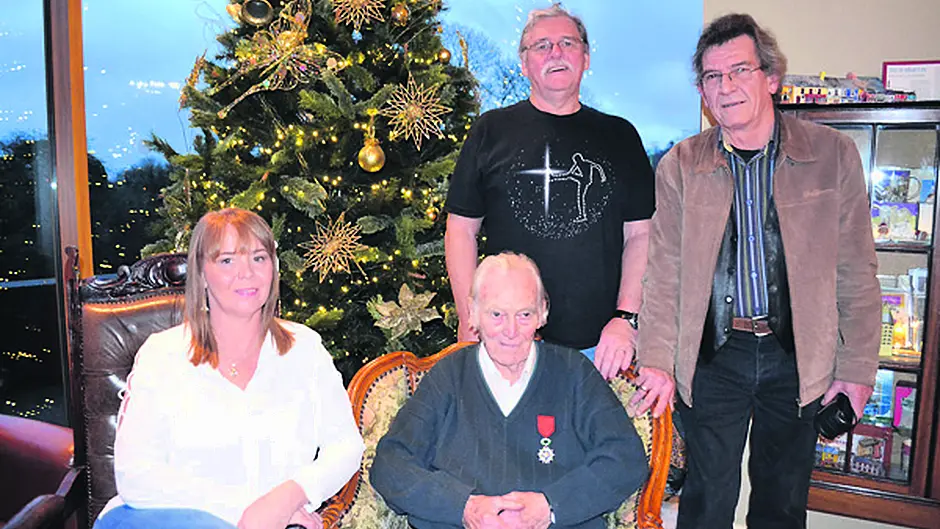FOR a quarter of a century, Englishman Geoffrey Williams has lived in West Cork, and it is to West Cork that the French government has sent his Légion d'Honneur medal.
BY JACKIE KEOGH
FOR a quarter of a century, Englishman Geoffrey Williams has lived in West Cork, and it is to West Cork that the French government has sent his Légion d’Honneur medal.
Geoffrey Williams (92), has been known to hold court at the West Cork Hotel – a venue he frequented on a daily basis until a fall, last July, meant he had to curtail his visits.
Geoffrey still goes to the hotel every Saturday, but last Saturday, December 23rd was made all the more special because Mike Robinson – the father of his friend Wendy Robinson – handed over the medal that had been entrusted to him by the French authorities.
Geoffrey was born in London but lived all his life in Surrey until he and his late wife, Fay, decided to check out Ireland as a possible destination for their retirement.
As a former surveyor, as well as a property manager for a very large company, Geoffrey knows property, so it should stand to reason that his experience would prove useful in the selection of their retirement home.
In fact, he said that he and his wife were only passing through when they stopped in Skibbereen.
By the time he got back to the car he found Fay talking to Noreen, the wife of Charlie McCarthy, who has a family-run estate agents in the town, and in no time at all three houses were selected for viewing.
Property manager and negotiator or not, Geoffrey was blind-sided when his wife – within full hearing of Charlie McCarthy – declared: ‘I want that.’
That was Abbey Lodge, their first home in West Cork. They stayed there for eight years before moving to Schull. They then lived there for six years until his wife got ill and subsequently died, which resulted in Geoffrey moving into one of the houses in the retirement village at Baltimore Road in Skibbereen in 2006.
Together Geoffrey and Fay had three children: Neil, Grant and Laura. Of marriage, he said: ‘Fay was a wonderful woman. She was a good housewife, a good cook. She didn’t smoke, or drink, or flirt. And she tolerated me.’
In September of this year, after a bout of ill health, Geoffrey gave up his house in the retirement village and moved into the Skibbereen Residential Care Centre next door.
In his other, younger, life, Geoffrey was 13 when World War 11 broke out in September 1939, and he and his classmates were evacuated to Bognor Regis, 60 miles away.
Having left school at the age of 14, Geoffrey started work as an office boy in a firm in London. By then, the Germans had started bombing London and Geoffrey recalled the day when their house was hit by an incendiary device.
His father, Lesley, an ARP air-raid warden, was on duty elsewhere and his mother, Edith, was taking shelter in the basement, but he was out on the street, scanning the skies for bombers.
The incendiary device landed on the roof of their house but rolled off because the pitch of the roof was so steep. It fell onto the ground where it was ‘splattering’ until Geoffrey put it out with a dustbin lid.
In 1942, at the age of 17, he decided to volunteer for the navy but ended up joining the army. It was that or face conscription as a Bevin Boy in the mining industry.
After signing up, he said he only had to wait two to three months before being called up on April 1st 1942 to do his six weeks training.
Geoffrey described the training as ‘tough – just like you see in the movies.’ And, the way he tells it, the British issue army black boots were the bane of his life.
‘They weren’t the best things to wear. They were very tough,’ said Geoffrey who somehow managed to get his hands on a pair of American boots made of ‘soft, brown leather.’
After his training, he was given the option of going into the infantry or the Royal Army Service Corps and he chose the corps because he wanted to drive.
‘I was transferred to a unit in Kensington Barracks and I was there until I was called up to a special unit, a service unit to the armoured division, which meant I was driving supplies to them when they were in battle.
‘I did that in France and Belgium and then I came unstuck. The tanks, obviously, are always up the front in no man’s land and one day when I was coming back to get some fresh supplies I ran over a landmine.
‘I bashed my skull and I have a nice dent there,’ said Geoffrey pointing to a part of the back of his head that should have a curve but does indeed look flat.
‘I got a slight concussion and I was taken by some of the others in the convoy to a field hospital for two days.
‘When I came out, I was transferred to an infantry company of the armed guard – the Argyle and Southern Highlanders Regiment – and was a driver on a troop carrying half-track, which meant we were advancing all the time.
‘We ended up at the Elbe, near Hamburg, in 1945 and I became a member of the occupation army in Germany. At the time, the infrastructure in Germany was in a hell of a state. It had been pounded to bits. My job was a driver in a relief organisation bringing food and water to different camps.’
Geoffrey was a soldier for four-and-a-half years. He spent his 21st birthday in Hamburg.
When asked about war and the impact it has on the lives of people, he said: ‘I saw some nasty things, but you get harder. You really do go away a boy and come back a man.’
He said he saw a teenage soldier from the Argyle and Southern Highlanders regiment get shot in the chest and, in the moments that he fell, he called out for his mother.
Geoffrey said it doesn’t matter how difficult it was to see something like that, or the burnt-out shell of a tank – that obviously had fatalities inside – ‘you just have to get on with it because there was no such thing as traumatic stress, or PTSD, in those days.’
When he talks about war, Geoffrey doesn’t glorify it. He makes it sound like a job. So, it doesn’t come as a surprise that he is rather nonchalant about the fact that the French government want to give him their highest decoration.
‘It is not a medal for personal gallantry. It is what is known as a campaign medal,’ said Geoffrey, who already has two other war medals.
He explained that two years ago the French government decided – for some reason unknown to him – to present all living veterans involved in the Normandy Landings with the Légion d’Honneur medal.
He was part of the Normandy Landing on Day Three, June 6th. He was ‘apprehensive but too young to be terrified.’
He could hear the bullets and the shelling, and see his comrades falling, but he said: ‘that is part of being a soldier.’
Even at the age of 92, Geoffrey has a certain sangfroid, saying he wanted ‘no fuss’ when the medal was being presented to him on Saturday, December 23rd.
The logistics of receiving the medal is another story entirely. Wendy Robinson – who works at the Skibbereen Residential Care Centre and has known Geoffrey for years – had been trying to secure the medal for the last two years.
But it was only after her dad, Mike Robinson, agreed to take receipt of it that it finally made its way to West Cork and into Geoffrey’s possession.
Geoffrey told The Southern Star: ‘I am happy to receive the medal. It brings back memories – not all of which are bad.’









